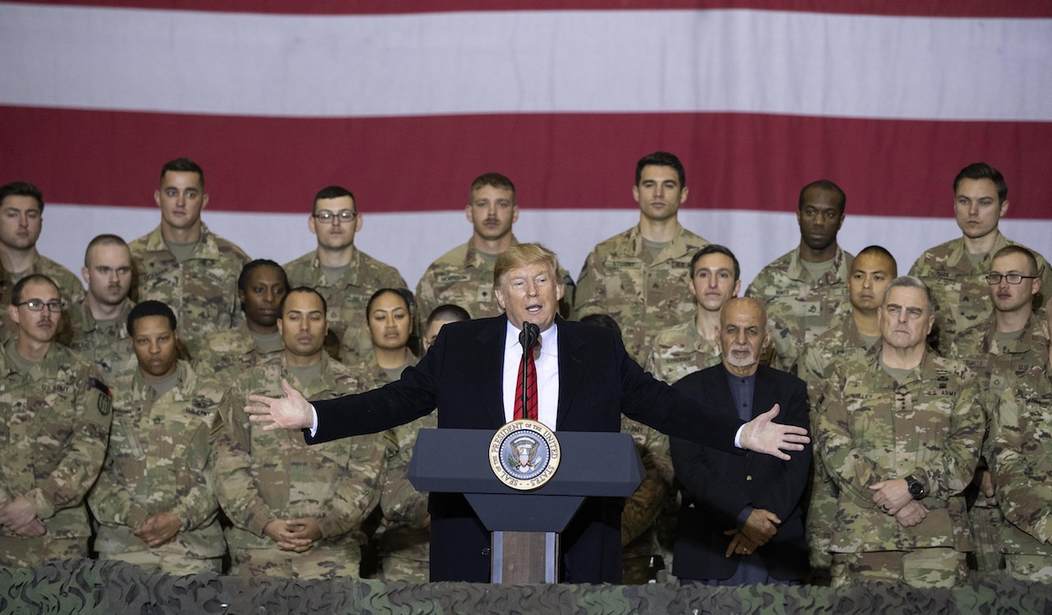President Trump is withdrawing a significant number of troops from Afghanistan, and Senate Majority Leader Mitch McConnell is livid. According to AP, McConnell “warned against a potentially ‘humiliating’ pullout from Afghanistan that he said would be worse than President Barack Obama’s 2011 withdrawal from Iraq and reminiscent of the U.S. departure from Saigon in 1975.” Not to be outdone, Rep. Michael McCaul, Republican leader on the House Foreign Affairs Committee, insisted: “We need to ensure a residual force is maintained for the foreseeable future to protect U.S. national and homeland security interests and to help secure peace for Afghanistan.” But McConnell and McCaul are advocating for a failed policy. It is long past time to leave Afghanistan.
In his State of the Union address on February 5, 2019, President Trump stated: “As a candidate for President, I pledged a new approach. Great nations do not fight endless wars.” Epitomizing the need to do this was what happened when Trump first moved to end America’s longest endless war, the war in Afghanistan, with a treaty with the group that the U.S. entered Afghanistan in order to topple, the Taliban, in February 2020. The ink was still fresh on the signed document when the Taliban launched a new attack against Afghan government forces, killing twenty Afghan soldiers and police officers.
The attack was a fitting symbol of the fruitlessness of these endless wars and the bankruptcy of the assumptions and policies that had led to their being waged.
After all these years, we have little to show for all our efforts in the nation that has been ominously dubbed the “graveyard of empires.” The U.S. has sacrificed the lives of numerous heroic service members and squandered trillions for nearly two decades in the fond hope that it could remake Afghanistan into a stable, Western-style republic that would respect the human rights of all its citizens. That’s still the plan, as far as the architects of our intervention are concerned: One foreign policy establishment wonk counseled patience, saying that Afghanistan “is not going to become Switzerland overnight,” a fact that is as obvious as Joe Biden’s dementia.
Great. So we know now after almost twenty years that it isn’t going to happen overnight, but how long exactly is it going to take? To that question the advocates of endless intervention have no definite answer. Former Secretary of Defense Donald Rumsfeld said in late 2019: “We are never going to get the U.S. military out of Afghanistan unless we take care to see that there is something going on that will provide the stability that will be necessary for us to leave.”
All right, but what’s it going to take? Do Rumsfeld, McConnell, and McCaul really think that after nearly twenty years, one more year, or five more years, or ten more years, will do the job?
Afghanistan will never be a Western-style republic and will likely never be free of the Taliban without a massive transformation of Afghan society, no matter how long we stay, and such a transformation is not on the horizon. This was clear relatively early in the conflict, but the obviousness of this fact did not make successive Republican and Democratic administrations rethink the wisdom of being there.
And so after all this American expenditure of personnel, money, and materiel, there is absolutely no doubt that once we leave, the Taliban will make gains and may even regain control of the Afghan government.
Did that mean that America had to keep troops there for fifty years? A hundred years? Should we just make Afghanistan the fifty-first state and seal our commitment there forever? Or should the U.S. instead focus on what is best for America in Afghanistan, working to contain the jihad there and to ensure that the Taliban does not and cannot engage in international jihad terror activity, while otherwise leaving the Afghans to their own devices?
America’s tragic misadventure in Afghanistan makes it clear that a new foreign policy strategy is urgently needed, and that the ideas and assumptions that have governed U.S. foreign policy for nearly a century needed to be consigned to the dustbin of history. President Trump had proposed to do that. Now we are likely to see instead a retrenchment of the forces that made the tragedy of two decades of war in Afghanistan happen in the first place. President Biden, or President Harris, or President Pelosi, or whatever horror show we may be facing next, could send the troops that Trump withdraws right back into the belly of the beast.
After all, as Trump said last September, “the top people in the Pentagon…want to do nothing but fight wars so that all of those wonderful companies that make the bombs and make the planes and make everything else stay happy. But we’re getting out of the endless wars, you know how we’re doing.” He is getting us out. Others, wanting to keep the Masters of War happy, may get us right back in.
Robert Spencer is the director of Jihad Watch and a Shillman Fellow at the David Horowitz Freedom Center. He is author of 21 books, including the New York Times bestsellers The Politically Incorrect Guide to Islam (and the Crusades) and The Truth About Muhammad. His latest book is Rating America’s Presidents: An America-First Look at Who Is Best, Who Is Overrated, and Who Was An Absolute Disaster. Follow him on Twitter here. Like him on Facebook here.










Join the conversation as a VIP Member